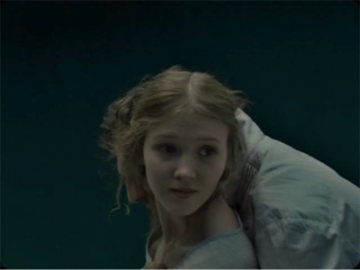Fall 2016 Film Series - “Body and Soul: The Films of Aleksandr Sokurov”

One of the greatest contemporary auteurs, Aleksandr Sokurov has been making art cinema, both fiction and documentary, since the late 1970s. Russian Film at Yale is proud to have gathered together a collection of films – some of them true rarities – for this magnificent program. Visually stunning and formally provocative, Sokurov’s unabashedly sensual work will move, unsettle, and perhaps even transport you. We are also delighted to be able to show several shorts made by Sokurov’s students or with his support. Please join us for this series of events with special guests. All films will be presented with English subtitles.
Whitney Humanities Center Auditorium, 53 Wall Street, New Haven
Free and open to public
September 28, 2016 - Moloch (1999) 102 min.
Sparking critical controversy upon its release, Sokurov’s meditation on power creates a portrait of Adolf Hitler and his coterie holed up in the Bavarian Alps for a retreat in the late spring of 1942.
Introduced by Paul North, Department of Germanic Languages and Literatures, Yale University
October 12, 2016 - Taurus (2001) 94 min.
The second part in Sokurov’s quartet of films concerning 20th-century tyrants, this story is based on the last days of the leader of the Bolshevik Revolution, Vladimir Lenin.
Introduced by Katerina Clark, Department of Slavic Languages and Literatures/Film and Media Studies, Yale University
Preceded by Slightly Opening the Door (2013) 12 min., dir. By Malika Musaeva
Malika Musaeva is a student of Aleksandr Sokurov’s Workshop at the Kabardino-Balkarian State University in Nalchik.
October 27, 2016 - Francofonia (2015) 90 min. followed by Cinemuse: Selfie with Sokurov (2016, documentary interview by Dragan Kujundžić)
Over a decade after his masterwork, The Russian Ark (2002), Sokurov’s Francofonia continues the tradition of the director’s “museum films.” Set in the Louvre during the Nazi occupation, this dark companion piece to his 2002 tour de force offers a visually stunning exploration of art and its place in history. The film premiered at the 72nd Venice International Film Festival and received the prestigious Fondazione Mimmo Rotella Award.
Presented by Dragan Kujundžić, University of Florida
*Please note that this special event will take place on a Thursday in Room 208 at the Whitney Humanities Center
November 9, 2016 - Faust (2011) 134 min.
In his take on the age-old tale of a man sacrificing his soul to the devil in exchange for knowledge, Sokurov continues his exploration of power started in Moloch and Taurus. With dazzling, constantly moving camera work, a richly textured soundscape, and a meticulously composed mise-en-scene, the film creates a vision of Goethe’s poetic drama unlike anything you’ve ever seen.
Introduced by Kirk Wetters, Department of Germanic Languages and Literatures, Yale University
Preceded by She is Waiting (2014), 7 min., dir. by Maryana Kalmykova
Maryana Kalmykova is a student of Aleksandr Sokurov’s Workshop at the Kabardino-Balkarian State University in Nalchik.
November 30, 2016 - Stone (1992) 83 min.
Susan Sontag described it as one of the best films of the 90s, and her own personal favorite. Set and shot in the Chekhov Museum, Stone has been described by various critics as “evanescent,” “fugitive,” and “oneiric.” A museum guard one night encounters an older man in the museum whose identity is uncertain. Could he be the famous writer’s ghost? The gorgeous black and white cinematography and carefully crafted soundtrack will leave you breathless.
Introduced by Toni Dorfman, Theater Studies, Yale University
Preceded by My Brother is a Superhero (2015), 23 min., dir. By Tatiana Rakhmanova.
Tatiana Rakhmanova’s film was made with the support of Aleksandr Sokurov’s Foundation for the Support of Cinema, “Primer Intonatsii.”
December 7, 2016 - Days of Eclipse(1988) 133 min.
As a young medical researcher posted to Soviet Turkmenistan looks into the health effects of religious practice, mysterious and inexplicable forces intervene in his personal quest for truth. This stunningly unconventional adaptation of brothers Arkady and Boris Strugatsky’s Soviet science fiction novella “Billion Years to the End of the World” is arguably Sokurov’s masterpiece.
Introduced by Dudley Andrew, Film and Media Studies/Department of Comparative Literature, Yale University
Sponsored by the Edward J. and Dorothy Clarke Kempf Fund at Yale University, the European Studies Council, the MacMillan Center, the Whitney Humanities Center, Yale Film and Media Studies, and the Yale Slavic Film Colloquium